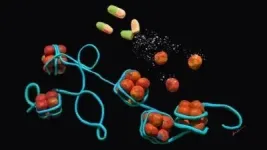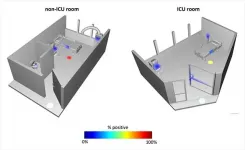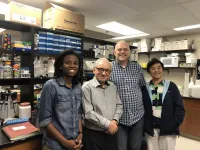Rapamycin changes the way our DNA is stored
Researchers discover an unexpected link between DNA winding and metabolism in the gut to ameliorate ageing
2021-06-09
(Press-News.org) Our genetic material is stored in our cells in a specific way to make the meter-long DNA molecule fit into the tiny cell nucleus of each body cell. An international team of researchers at the Max Planck Institute for Biology of Ageing, the CECAD Cluster of Excellence in Ageing research at the University of Cologne, the University College London and the University of Michigan have now been able to show that rapamycin, a well-known anti-ageing candidate, targets gut cells specifically to alter the way of DNA storage inside these cells, and thereby promotes gut health and longevity. This effect has been observed in flies and mice. The researchers believe this finding will open up new possibilities for targeted therapeutic interventions against ageing.
Our genetic material lies in the form of DNA in every cell nucleus of our body cells. In humans, this DNA molecule is two meters long - yet it fits into the cell nucleus, which is only a few micrometres in size. This is possible because the DNA is precisely stored. To do this, it is wound several times around certain proteins known as histones. How tightly the DNA is wound around the histones also determines which genes can be read from our genome. In many species, the amount of histones changes with age. Until now, however, it is unclear whether changes in cellular histone levels could be utilized to improve the ageing process in living organisms.
A well-known anti-ageing compound with a new target
The drug rapamycin recently became one of the most promising anti-ageing substances and shows positive effects on health in old age. "Rapamycin turns down the TOR signalling pathway that regulates a wide spectrum of basic cellular activities such as energy, nutritional and stress status. In short, we use rapamycin to fine-tune the master regulator of cellular metabolism", explains Yu-Xuan Lu, postdoc in the department of Linda Partridge and first author of the study. "Meanwhile, we know that histone levels have a critical impact on the ageing process. However, we had no idea whether there is a link between the TOR signalling pathway and histone levels, and more importantly, whether histone levels could be a druggable anti-ageing target."
To study the effect of rapamycin on histone proteins, the researchers analysed various organs of the fruit fly Drosophila melanogaster. "We looked in different tissues and organs of the fly for noticeable changes in histone levels before and after treatment with rapamycin, this means before and after switching off the TOR signalling pathway", explains Yu-Xuan Lu. "Surprisingly, we observed an increase in histone proteins after rapamycin treatment. This effect occurred exclusively in the gut of the flies, but not in other tissues." In further experiments, Yu-Xuan Lu and his colleagues were able to show that the increased levels of certain histone proteins in a specific gut cell type called enterocytes reduced tumour growth, improved gut health and extended lifespan of the animals. Similar observations were made in mouse gut enterocytes after rapamycin treatment.
"Our results show for the first time a link between the TOR signalling pathway and histone levels that determines longevity", says Yu-Xuan Lu. "The increased levels of histone proteins subsequently change how the DNA is stored in the nucleus. The fact that we were also able to make similar observations in mice shows that this is a widespread mechanism." Looking ahead to future experiments, he adds: "Given the central role of histones on DNA storage in the cell, this finding not only broadens our knowledge on the ageing process, but also provides new possibilities for targeted therapeutic interventions against ageing."
INFORMATION:
Original publication
Yu-Xuan Lu, Jennifer C. Regan, Jacqueline Eßer, Lisa F. Drews, Thomas Weinseis, Julia Stinn, Oliver Hahn, Richard A. Miller, Sebastian Gro?nke and Linda Partridge.
A TORC1-histone axis regulates chromatin organisation and non-canonical induction of autophagy to ameliorate ageing.
eLife, 2021
[Attachments] See images for this press release:

ELSE PRESS RELEASES FROM THIS DATE:
2021-06-09
BOSTON - A new analysis by researchers at Massachusetts General Hospital (MGH) offers a novel perspective on the disproportionate impact that COVID-19 has had on people of color, low-income populations, and other structurally disadvantaged groups. Their findings, published in a research letter to the END ...
2021-06-09
For decades, physicians and dieticians have urged people to limit their intake of high fat foods, citing links to poor health outcomes and some of the leading causes of death in the U.S., such as diabetes, heart disease and cancer.
According to the Centers for Disease Control and Prevention, dietary components high in saturated fats such as red meat are thought to be risk factors for colon cancer. Diet is thought to strongly influence the risk of colorectal cancer, and changes in food habits might reduce up to 70% of this cancer burden.
Other known epidemiological risk factors are family history, inflammatory bowel disease, ...
2021-06-09
Watching what was happening around the world in early 2020, University of California San Diego School of Medicine researchers knew their region would likely soon be hit with a wave of patients with COVID-19, the infection caused by the coronavirus SARS-CoV-2. They wondered how the virus persists on surfaces, particularly in hospitals, and they knew they had only a small window of time to get started if they wanted to capture a snapshot of the "before" situation -- before patients with the infection were admitted.
After a call late one Sunday night, a team assembled in the ...
2021-06-09
MELVILLE, N.Y., June 9, 2021 -- In the evolutionary battle between hunter and hunted, sound plays an integral part in the success or failure of the hunt. In the case of bats vs. moths, the insects are using acoustics against their winged foes.
During the 180th Meeting of the Acoustical Society of America, which will be held virtually June 8-10, Thomas Neil, from the University of Bristol, will discuss how moth wings have evolved in composition and structure to help them create anti-bat defenses. The session, "Moth wings are acoustic metamaterials," will take place Wednesday, June 9, at 1 p.m. Eastern U.S.
Nocturnal moths ...
2021-06-09
MELVILLE, N.Y., June 9, 2021 -- The prolonged impact of the COVID-19 pandemic and the interaction restrictions created widespread lockdown fatigue and increased social tension in multiunit housing. But small improvements in quality-of-life routines may help people cope with the health restrictions better than they previously could.
During the 180th Meeting of the Acoustical Society of America, which will be held virtually June 8-10, Braxton Boren, from American University, will discuss noise prevention techniques and the use of alterative acoustic stimulation to help those who find themselves in pandemic-related lockdowns. The session, "The Soundscape of Quarantine," will take place Wednesday, June 9, at 1:45 p.m. Eastern U.S.
While there have been studies about ...
2021-06-09
The SARS-CoV-2 papain-like protease (PLpro) plays an essential role in processing viral proteins needed for replication. In addition, the enzyme can cut and inactivate some human proteins important for an immune response. Now, researchers reporting in ACS Infectious Diseases have found other targets of PLpro in the human proteome, including proteins involved in cardiovascular function, blood clotting and inflammation, suggesting a link between the inactivation of these proteins and COVID-19 symptoms.
Viruses like SARS-CoV-2 make multiple proteins as one long "polyprotein." Viral enzymes called proteases recognize specific amino acid sequences in this polyprotein and cut them to release individual proteins. ...
2021-06-09
A cell-penetrating peptide developed by researchers at Vanderbilt University Medical Center can prevent, in an animal model, the often-fatal septic shock that can result from bacterial and viral infections.
Their findings, published this week in Scientific Reports, could lead to a way to protect patients at highest risk for severe complications and death from out-of-control inflammatory responses to microbial infections, including COVID-19.
"Life-threatening microbial inflammation hits harder (in) patients with metabolic syndrome, a condition afflicting millions of people in the United States and worldwide," said the paper's corresponding author, Jacek Hawiger, MD, PhD, the Louise B. McGavock Chair in Medicine and Distinguished Professor of Medicine ...
2021-06-09
BRIEFING NOTE: Researchers will announce these results at the 238th AAS meeting on Wednesday, June 9 at 12:15 p.m. E.D.T. Press registration details can be found here: https://aas.org/meetings/aas238/press. Interested journalists can also tune in to AAS briefings streamed live at: https://www.youtube.com/c/AASPressOffice. Please note that you will not be able to ask questions via YouTube; to ask questions, you'll need to register for the meeting and join the briefings via Zoom. Recordings will be archived on the AAS Press Office YouTube channel afterward.
To catch sight of a fast radio burst is to be extremely lucky in where and when you point your radio dish. Fast radio bursts, or FRBs, are oddly bright flashes of light, registering ...
2021-06-09
OAKLAND, Calif. -- The significant declines in heart attack hospitalizations and emergency care for possible strokes seen in Northern California at the beginning of the COVID-19 pandemic were not seen in subsequent surges, new research from Kaiser Permanente shows.
The study, published June 2 in JAMA, suggests public health campaigns that encouraged people to seek care if they were experiencing signs or symptoms of a stroke or heart attack were effective.
"In May 2020, we reported that, in the early months of the pandemic, the weekly number of patients admitted to our hospitals for a heart attack fell to nearly half of what would be expected," said the study's lead author Matthew ...
2021-06-09
A new study identifies a novel biomarker indicating resilience to chronic stress. This biomarker is largely absent in people suffering from major depressive disorder, and this absence is further associated with pessimism in daily life, the study finds.
Nature Communications published the research by scientists at Emory University.
The researchers used brain imaging to identify differences in the neurotransmitter glutamate within the medial prefrontal cortex before and after study participants underwent stressful tasks. They then followed the participants for four weeks, using a survey protocol to regularly assess how participants rated their expected and experienced outcomes for daily activities.
"To our knowledge, this is the first work to show ...
LAST 30 PRESS RELEASES:
[Press-News.org] Rapamycin changes the way our DNA is stored
Researchers discover an unexpected link between DNA winding and metabolism in the gut to ameliorate ageing



